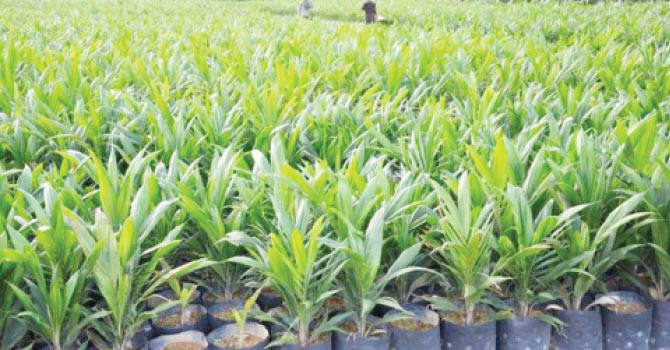How Nigeria can become self-sufficient in oil palm – Inyang
National President, National Palm Produce Association of Nigeria (NPPAN), Alphonsus Inyang, has stated that Nigeria can become self-sufficient in the production of oil palm if some measures are put in place by government and other stakeholders. Speaking with Daily Trust on the state of the oil palm sector in the country, the president stated only […]

Oil palm seedlings
National President, National Palm Produce Association of Nigeria (NPPAN), Alphonsus Inyang, has stated that Nigeria can become self-sufficient in the production of oil palm if some measures are put in place by government and other stakeholders.
Speaking with Daily Trust on the state of the oil palm sector in the country, the president stated only fifty percent of the oil palm consumed in the country is produced locally and called for concerted effort to change the situation.
He said, “our members produce 80 percent of the palm oil that is produced in this country, we are scattered all over the country, including even states that do not produce, our members are the ones selling in those states.
“Nigeria produces only 50 percent of what we consume, so we cannot talk about banning importation.”
He however said if we are talking about self-sufficiency, “what we need is inputs, we need a programme where seedlings will be made available for our members, fertilisers and other agro chemicals, government should partner with us in the implementation of our ‘One Family Twenty Palm Project’, where we give twenty seedlings to families and fertilisers.”
Speaking on the projects, he said: “NPPAN has what we called One Family Twenty Palm Project, that is 20 palm trees per Household, we have been working on and we have been calling for support from the government to enable us to access inputs to distribute to families in various communities.
“We are yet to get support, we have commenced the project at the level of our association, by enlisting families. Last year, we distributed oil palm seedlings of over two hundred thousand to rural farmers and this year hopefully, we will do the same thing.
“This year, we will be distributing about one hundred thousand because of funding. You know we are doing these things by ourselves. We are concentrating on our members in the rural areas.”
He explained that “these are the things we expect the government to come in and do for us. The state government and federal government should give us seedlings to distribute to our farmers.
“If every family plants twenty palm trees, they can never buy oil, they will even have what to sell in their areas. Oil palm grows very well in 24 states of the country, these are the states with comparative advantage for oil palm.”
He said the association has made presentations and written letters to government, “but they are yet to respond to us, but oil palm is an important crop, it does not have a substitute, for example if you cannot buy Garri, you can buy rice or beans, these are substitute, if you are cooking in Nigeria, you need palm oil.
“It is our traditional crop and if you plant one it will be there for you for 40-50 years and after three years, it will start producing, so we need government’s intervention.”
